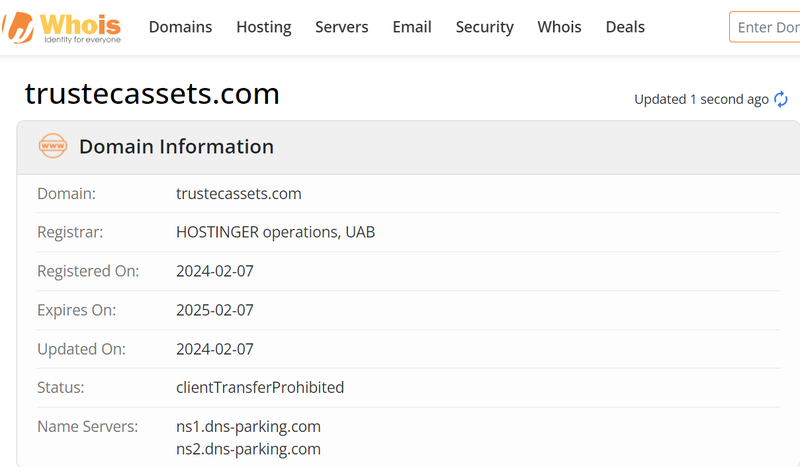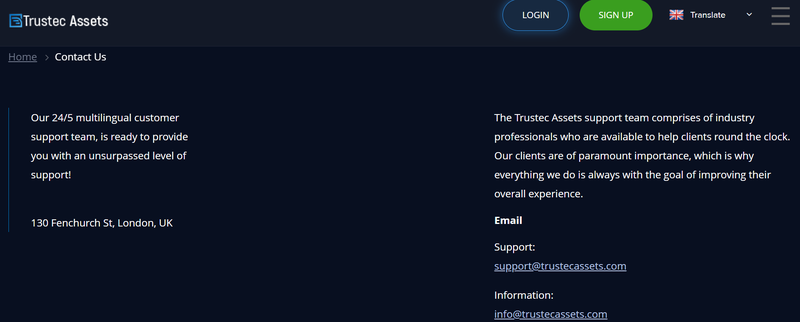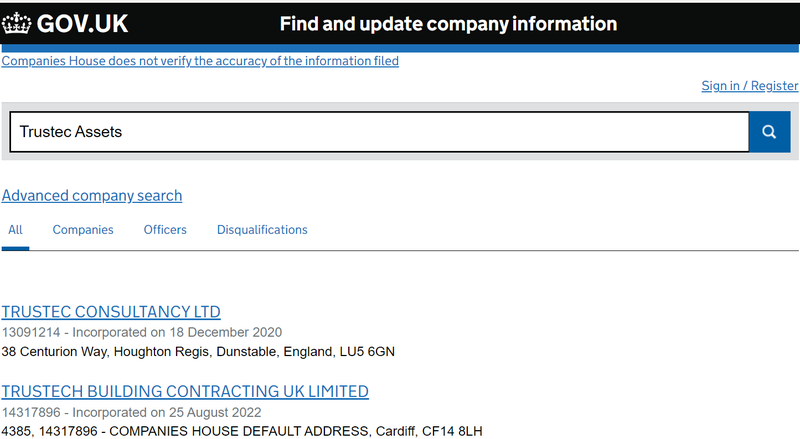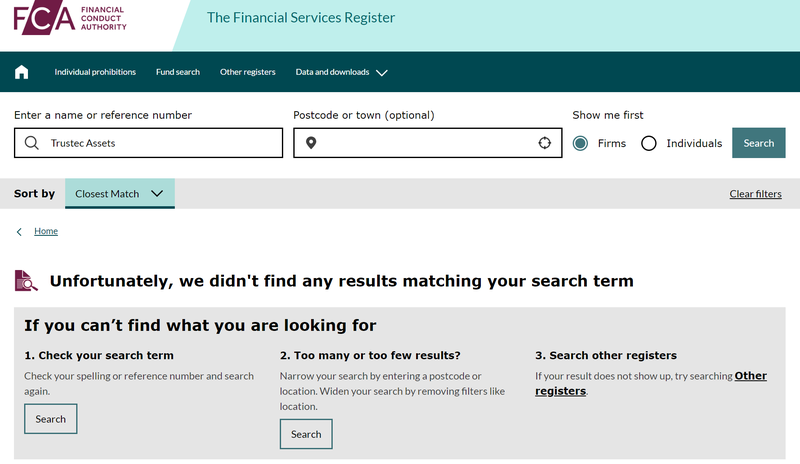Overview
Trustec Assets is a newly established forex broker that offers various trading markets through its proprietary platform and mobile application. However, the lack of regulatory information and clear company registration details calls its legitimacy into question. This article will delve into these issues, analyze what financial fraud is, and discuss what to do if you believe you have been scammed. We will also provide real-world cases to enhance understanding of these issues.
Background
Trustec Assets was established on February 7, 2024, claiming to offer multiple trading markets, including forex, stocks, indices, energy, metals, cryptocurrencies, and ETF CFDs. While its services appear promising, potential clients should remain cautious regarding the broker’s regulatory status. Many forex brokers operate in highly regulated environments, and the absence of such regulation may indicate deeper issues.

Case Study: The OneCoin Scam
OneCoin is a classic example of a forex scam that was founded in 2014, with its creators claiming it was an investment opportunity in cryptocurrency. OneCoin lacked transparent regulation and was ultimately proven to be a Ponzi scheme, leading to losses exceeding €4 billion for tens of thousands of investors. This case illustrates the dangers of a lack of oversight and transparency, as many investors fell into financial crises chasing false promises of high returns.
Registration Information
Trustec Assets has not disclosed its company registration information on its official website. Verification of the provided contact address “130 Fenchurch St, London, UK” reveals no records with Companies House or the Financial Conduct Authority (FCA) in the UK. This lack of transparency is concerning, similar to the BitConnect case, which faced global scrutiny for failing to provide valid registration information, ultimately resulting in massive losses for investors.


Importance of Registration Information
Understanding a broker’s registration information is crucial, as it directly relates to the safety of investor funds. Compliant brokers typically provide detailed company registration information and display registration numbers and licenses on regulatory websites. This not only safeguards investors’ rights but also enhances trust in the broker.
Real-World Case: eToro vs. Unregulated Brokers
Take eToro, for example; it is a regulated forex broker that allows investors to check detailed registration information and regulatory qualifications on its website. However, some unregulated brokers, like certain dubious forex platforms, often claim to be regulated in their promotions but provide no real registration information. This misleading advertising often leads investors to lose their funds.
Regulatory Information
The lack of regulatory oversight clearly raises major alarms. Legitimate brokers typically register with relevant financial institutions that enforce regulations to protect investors. For example, the FCA in the UK ensures that brokers adhere to strict guidelines to safeguard client funds. Trustec Assets lacks such information, suggesting it may be operating outside of regulatory scrutiny, akin to the Forex Trading Scam cases where victims were promised high returns only to find their investments vanished without a trace.

Role of Regulatory Agencies
The primary responsibility of regulatory agencies is to protect investors and maintain fairness and transparency in financial markets. They ensure compliance by brokers through regular audits, market reports, and penalties. For instance, the FCA will impose fines on non-compliant brokers and require them to compensate victims for their losses.
Case Study: The Wirecard Scandal
The Wirecard scandal involved a once-prominent German fintech company that collapsed due to regulatory noncompliance. The company was accused of inflating revenues and assets, leading to nearly €15 billion in investor losses. Many victims sought legal help and reimbursement after the event, but the lack of legitimate registration significantly reduced their chances of recovering funds. This event underscores the importance of regulation and the disastrous consequences that can arise from a lack of oversight.
Suspicions of Financial Fraud
Given the incomplete registration information, there are serious suspicions that Trustec Assets may be involved in financial fraud. Financial fraud typically includes schemes designed to illegally siphon funds from innocent individuals or entities. For example, the PlusToken Ponzi scheme promised high returns while ultimately defrauding global investors out of billions of dollars.
What is Financial Fraud?
Financial fraud encompasses various deceptive schemes, including Ponzi schemes, investment scams, and unauthorized trading. These schemes often promise low-risk, high-return investments that ultimately lead to significant financial losses for investors.
Common Types of Financial Fraud
- Ponzi Schemes: These operate by using new investors’ funds to pay returns to earlier investors, creating the illusion of profitability.
- False Investment Opportunities: Claims of certain investment projects that can provide extraordinary returns, which ultimately do not exist.
- Unlawful Brokers: Brokers that are unregistered or poorly regulated, using deceptive marketing tactics to attract investors.
Real-World Case: The Kryptos Scam
Kryptos is a classic example of a cryptocurrency investment scam where the operators promised investors high returns but quickly disappeared after amassing significant funds, resulting in severe losses for hundreds. This case highlights the importance of investigation and verification of an investment platform’s legitimacy before making decisions.
What to Do if You Suspect You’ve Been Scammed?
If you suspect you have become a victim of financial fraud, taking prompt action is crucial:
- Stop All Transactions: Immediately halt any trading with the suspected broker.
- Document Everything: Keep records of all communications, transactions, and related documents.
- Contact Your Bank: Notify your financial institution to report the fraud and potentially recover funds.
- Report to Authorities: File complaints with local law enforcement and relevant financial regulatory bodies.
Case Study: Ethereum Trading Scam
In the Ethereum trading scam, many investors suffered losses due to their failure to act promptly. Many victims sought help from banks and authorities only after realizing they had been scammed, but delays significantly reduced their chances of recovering funds. This illustrates the importance of quick action upon noticing suspicious activity.
How to Recover Funds After Confirming Fraud?
If you confirm you have been scammed, take the following steps to try to recover your funds:
- Consult a Legal Professional: Seek advice from a lawyer specializing in financial fraud cases.
- File Complaints: Report the fraud to consumer protection agencies and financial regulatory authorities.
- Join Support Groups: Connect with others who have faced similar issues for guidance and support. For instance, many victims have found valuable information and support through networks like Investors Recovery, helping them navigate fraud issues more effectively.
Real-World Case: Wirecard Victims
In the Wirecard incident, many investors sought legal assistance to recover their losses. Although the results were often disappointing, establishing support networks allowed them to share information and resources, helping them cope with similar issues. The solidarity and information-sharing among victims enhanced their chances of recovering lost funds.
Conclusion and Warning
In summary, while Trustec Assets offers various trading options, the lack of regulatory transparency and company registration information raises significant concerns. Potential investors should approach this broker with caution and remain vigilant against possible scams in the forex market. Remember, as warned by the U.S. Securities and Exchange Commission (SEC): “If it sounds too good to be true, it probably is.”
Frequently Asked Questions
Q1: Is Trustec Assets regulated?
A1: No, there is currently no information indicating that Trustec Assets is regulated by any financial authority.
Q2: How can I verify the legitimacy of a broker?
A2: Check if they are registered with financial regulatory bodies, review customer feedback, and ensure operational transparency.
Q3: What should I do if I think I’ve been scammed?
A3: Stop all transactions, document everything, contact your bank, and report to authorities.
Q4: Can I recover losses from fraud?
A4: While recovering funds can be challenging, seeking legal advice and reporting to authorities can increase your chances of success.
Q5: What are the signs of financial fraud?
A5: Common warning signs include promises of high returns with low risk, lack of transparency, and unregulated status.



